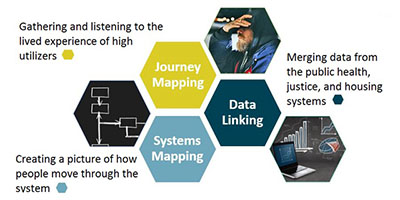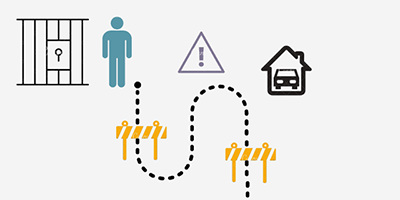Road Map Initiative

Most major cities, including Chicago, face the issue of people cycling across hospital emergency departments, homeless services and the criminal-legal system. In the absence of a standardized definition of “high utilizers” and a clear understanding of how they interact with systems, cities have struggled to effectively coordinate care across these sectors. We wanted to understand the scope and breadth of these service use patterns and identify the roadblocks and systemic gaps in the processes they encounter. This would help develop data-driven policies and programs to improve the outcomes of this highly vulnerable population while also potentially leading to more cost-effective – and more successful – use of public resources and services.
See: RMI in the News for Crisis Housing for Homeless with SUD
Lessons Learned in 2022
- Chicago and Cook County lack a housing continuum with stable, quality housing for people with involvement in the criminal-legal system.
- Many people leaving the jail want to return to family after leaving custody, but Public Housing Authority rules and a lack of flexibility in housing subsidies make that almost impossible.
- The housing system has shouldered the brunt of Illinois’ lack of investment in behavioral health services.
IN A NUTSHELL
The Road Map Initiative is focused on solution building that marries data analysis with systems thinking to remove roadblocks to services for people who are in need. The results can help policymakers, administrators of programs and services, and direct-service professionals by:
- Addressing policies and practices that result in systemic racism.
- Informing the allocation of resources to disrupt cycling across multiple systems and incentivize cross-sector, cross-provider coordination and collaboration.
- Improving quality of life for Chicagoans cycling across our emergency services.

BACKGROUND
The project grew out of an innovative cross-sectoral partnership among policymakers, content experts, and practitioners founded by Smart Policy Works, Treatment Alternatives for Safe Communities and Mercy Housing Lakefront. With lead partners comprising health, housing and justice organizations, it focused on the challenges and cost of serving “high utilizers” of public services across sectors – those who cycle in and out of emergency rooms and hospitals, homeless shelters, and the jail.

DISCOVERIES
The University of Chicago’s Urban Lab – Health Lab analyzed data sets for 2013-2017 from the Homeless Management Information System and Cook County Sheriff’s Office and administrative hospital records provided by the Illinois Department of Public Health. Smart Policy Works and Heartland Alliance Health held sessions with a range of stakeholders stakeholders and performed qualitative analyses provided. Some key insights:
- Very few people accessed all three sectors over four years. Even fewer persisted in their cycling, and these spent 1 out of every 5 days in an institutional setting. Service utilization cost for this group cost $300 million over four years.
- Homeless-services clients are most likely to have cross-sectoral engagement. Four out of 10 have at least one hospital or jail stay over four years.
- The effects of systemic racism are apparent. Of people cycling across all three systems, 84% are Black, 79% over the age of 45. Almost half of people cycling between CCJ and emergency shelters are under 35.
- Cycling high users are more likely to need detox when detained in Cook County Jail. The Jail provides us a window into the underlying SUD needs of people cycling across systems.
- Access to stable housing is a challenge. Of people cycling in all three sectors, only 15% accessed permanent housing in the continuum of care.

MILESTONES
2022 – In RMI Phase III, we tested these scalable models in the real world, focusing on flexible supports and temporary stabilization housing. These models are rooted in moving away from basing service provision on a pathological diagnosis and toward meeting people where they are.
2021 – In RMI Phase II, Smart Policy Works and Heartland Alliance Health design targeted interventions. RMI convenes stakeholder meetings of more than 300 health and social services providers, state/county/city government agencies, and people with lived experience to craft scalable pilots that optimize Medicaid-reimbursable services. Smart Policy Works and Heartland Alliance Health work with the Sheriff’s Office and the Illinois Health Practice Alliance to perform rapid-cycle operations tests that link data daily to identify IHPA’s members and allow “warm hand-offs” to providers.
2020 – Urban Labs-Health Lab completes cross-sector data linking. The resulting unique, data-informed framework for strategic interventions is the culmination of RMI Phase I. A notable finding was the magnitude of the racial health disparities and the “criminalization” of black and brown men with significant behavioral health issues. Overview of Findings
2019 – Urban Labs – Health Lab and Smart Policy Works co-convenes a Data Advisory Council of key organizations. Smart Policy Works conducts “journey mapping” with people with lived experience.
2017-18 – Smart Policy Works convenes partners to begin systems-process and, working with the University of Chicago’s Urban Lab – Health Lab, launches an effort to link data across the three systems. Smart Policy Works, Safer Foundation and TASC conducted a housing stability survey of people involved in the criminal-legal systems.
Phase I: Data-Informed Framework – Phase II: Analysis to Action – Phase III: Real World Test
WHAT’S NEXT?
The RMI Phase III objectives are all about improving outcomes and improving value:
- Demonstrate that person-centered services improve quality of life, address basic needs, decrease utilization of costly services like hospital EDs, and keep people out of the Cook County criminal-legal system.
- Stabilization housing plus flexible person-centered services are critical to make any housing option work for people who cycle across systems and crisis services. Services follow people, no matter what their living situation may be.
- Promote sustainable policy and practice changes to support person-centered services and strategic investments in housing beyond the pilots.
STEERING COMMITTEE
- Smart Policy Works LLC
- Heartland Alliance Health
- TASC, Inc.
- Mercy Housing Lakefront
- IL Justice Project
- Safer Foundation
- All Chicago
- Cook County Sheriff’s Office
- Justice System Partners
- UIC Health & Hospitals System
- Chicago Department of Family Support Services, Homeless Prevention Services
- Chicago Department of Public Health
- Chicago Department of Housing
- Bobby E. Wright Center
- Illinois Health Practice Alliance
CONNECT WITH THE INITIATIVE
For more information contact Barbara Otto, barbara@smartpolicyworks.com, or Ed Stellon, estellon@heartlandalliance.org.
Let’s achieve change together